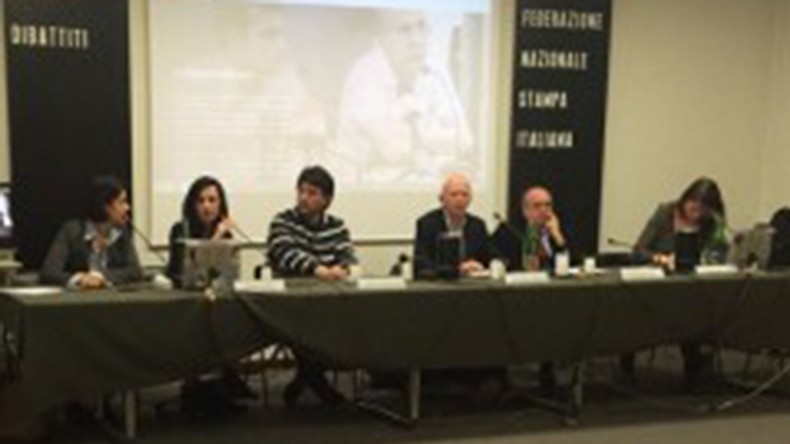
Azerbaijan Embassy in Rome sends spies to break international organizations’ discussion of its repressions
The Embassy of Azerbaijan Republic in Rome used any possible method in an attempt to break the meeting on “Azerbaijan: invisible repressions” organized by international human rights organization Amnesty International, research center OsservatorioBalcani, and Re-common association in the headquarters of Italian National Press Federation (FNSI), Articolo 21 reports.
According to the information, the Azerbaijani diplomatic representation first sent about 20 inquiries on the given topic to FNSI with that aim. Then, the organizers say, when the meeting was held after all, the FNSI hall was “captured” by the representatives of the embassy of Azerbaijan.However, members of “Digos”, the General Investigations and Special Operations Division of the Italian police,quickly arrived in the scene for reestablishing order. Still, even their presence did not stop the troublemakers as they continued to intervene in the discussions and take photos of the attendees.
According to the article, DinaraYunus, the daughter of political prisoners Leila Yunus and ArifYunus, was among the speakers, and she was afraid that “with the presence of spies of the official Baku, her words can provoke a toughening of repressive measures against her parents.”
At the end of the meeting, the supposed leader of the Azerbaijanis’group attempted to take the floor. However,FNSI president Beppe Giuliettiresponded, “You will have the opportunity to speak when 532 names are excluded from the list of personae non grata.”
Articolo 21 informs that 532 people from different parts of the world have been included in Baku authorities’ “black list” of personae non grata. Entire theatre staffs, musicians, writers, journalists, 20 Italians, including writer Antonia Arslan and journalist Milena Gabanelli, are among them. They appeared in the list only because they are “guilty” of visiting the NagornoKarabakh Republic due to their activities.
However, Articolo 21 writes that “Azerbaijan’s dark side” is absolutely somewhere else. Every day, basic human rights are systematically violated in Azerbaijan. According to Amnesty International’s report, the authorities of the country and groups connected with them bring groundless criminal charges against innocent people. Thisis often accompaniedwith physical attacks, oppressions, blackmail, and other forms of repression. The police regularly use their impunity. Members of corresponding organs torture the detained activists of the civil society. It was mentioned during the meeting that Freedom House, an international human rights organization, also condemns the fact that Azerbaijan authorities intimidate activists more and more. The international organization counts at least 18 “prisoners of conscience,” who are imprisoned only because they have peacefully used their right of the freedom of expression.
The Italian portal also highlights that these repressions remain “invisible,” as Azerbaijan is an “attractive” country. For example, Trans Adriatic Pipeline (TAP), a pipeline for transporting natural gas from Azerbaijan to Italy. And the FNSI incident, in its turn, was a demonstration of arrogance – an obvious result of the sense of impunity, as democracy norms have a very little role when it comes to business interests.
In January 2016, the Embassy of the Azerbaijan Republic in Italy published a list of journalists whose entry to Azerbaijan is banned. The “black list”includes prominent representatives of Italian culture, journalists, writers and painters, including Antonia Arslan and Milena Gabanelli, a well-known journalist. Simone Zoppellaro, the correspondent of OsservatorioBalcani e Caucaso, is also included together with the colleague of the Italian newspaper La Stampa, Roberto Travan.The Italian media called the list “a striking violation of the principles” of freedom of expressionmore than once addressed in the speeches of Nils Muiznieks, theCommissioner for Human Rights of the Council of Europe, and DunjaMijatovic,OSCERepresentative on Freedom of the Media
Newsfeed
Videos






























